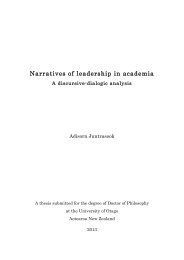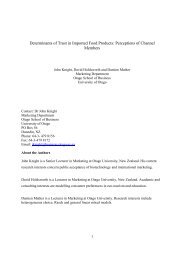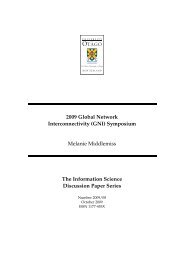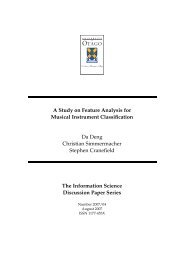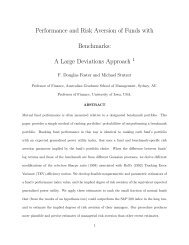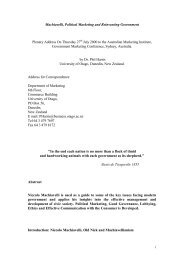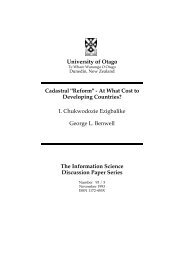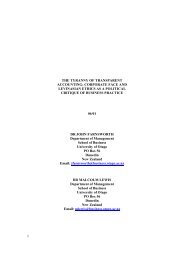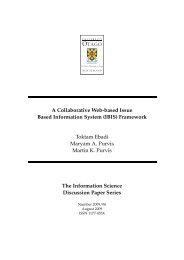Where is R2P grounded in international law? Anne-Marie Judson A ...
Where is R2P grounded in international law? Anne-Marie Judson A ...
Where is R2P grounded in international law? Anne-Marie Judson A ...
You also want an ePaper? Increase the reach of your titles
YUMPU automatically turns print PDFs into web optimized ePapers that Google loves.
SUMMARY<br />
<strong>R2P</strong> <strong>is</strong> not a new doctr<strong>in</strong>e. Th<strong>is</strong> can be seen by the attempts to clarify the rights,<br />
duties and responsibilities of states <strong>in</strong> the early stages of the United Nations General<br />
Assembly debates and the International Law Comm<strong>is</strong>sion’s proposals on state<br />
responsibility.<br />
The research <strong>in</strong> the second chapter clarified that states have responsibilities <strong>in</strong><br />
<strong>in</strong>ternational <strong>law</strong> through attribution to acts or om<strong>is</strong>sions of the state <strong>in</strong> question. Th<strong>is</strong><br />
complements the <strong>R2P</strong> World Summit outcome whereby states firstly have the<br />
responsibility to prevent and protect their citizens from harm. Th<strong>is</strong> chapter showed<br />
how ‘responsibility’ <strong>is</strong> not a new idea and that it <strong>is</strong> well <strong>grounded</strong> <strong>in</strong> <strong>in</strong>ternational<br />
op<strong>in</strong>ions and jur<strong>is</strong>. The draft declaration on rights and duties of a state showed that<br />
responsibility has been a concern of the United Nations General assembly s<strong>in</strong>ce 1946.<br />
Th<strong>is</strong> l<strong>in</strong>ked <strong>in</strong> with the International Law Comm<strong>is</strong>sion through their magnum opus on<br />
state responsibility. The first Special Rapporteur, Garcia Amador and the second,<br />
Roberto Cohen showed how responsibility entailed the whole area of <strong>in</strong>ternational<br />
<strong>law</strong>. They clarified that obligations erga omnes or jus cogens rules were applicable to the<br />
prevention of genocide and that th<strong>is</strong> was b<strong>in</strong>d<strong>in</strong>g on all states.<br />
The rul<strong>in</strong>gs of courts as expla<strong>in</strong>ed <strong>in</strong> the second chapter also showed how will<strong>in</strong>g the<br />
courts were to adopt responsibility as <strong>in</strong>ternational <strong>law</strong>. Th<strong>is</strong> clarified that<br />
responsibility not only entailed duties but also obligations that could manifest <strong>in</strong>to<br />
breaches and violations of <strong>in</strong>ternational <strong>law</strong> <strong>in</strong>herently threaten<strong>in</strong>g peace and<br />
<strong>in</strong>ternational security. Prevention was shown as commitment to implement<br />
<strong>in</strong>ternational jur<strong>is</strong>diction <strong>in</strong>to local leg<strong>is</strong>lation and education and breaches <strong>in</strong>cluded<br />
om<strong>is</strong>sions, actions, and the failure to act. Attributions <strong>in</strong>cluded once aga<strong>in</strong> om<strong>is</strong>sions,<br />
actions and the failure to act <strong>in</strong>clud<strong>in</strong>g the failure to implement, direct, control and<br />
manage persons or people carry<strong>in</strong>g out governmental authority. The acceptance of<br />
actions could equate to attribution as was seen <strong>in</strong> the Tehran case. Th<strong>is</strong> also showed<br />
how states can be attributed responsibility even when they did not <strong>in</strong>itially <strong>in</strong>stigate<br />
the violation or breach.<br />
<br />
54



